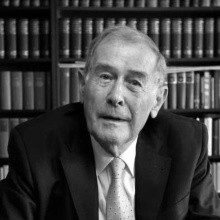The University of Stuttgart mourns an expert in National Socialism and Holocaust research, the retired professor of history, Eberhard Jäckel, who was held in high esteem across the globe. He passed away on 15th August 2017 at the age of 88.
For thirty years, until his retirement in 1997, Professor Eberhard Jäckel was the head of the Modern History Department at the University Stuttgart. During this time he made an essential contribution to the outstanding international reputation of the University. The fact that he remained one of the leading and internationally renowned German historians even after his retirement is thanks to Professor Jäckel’s excellent research achievements and his character.
Eberhard Jäckel, born in Wesermünde in 1929, studied history, classic philology and public law in Göttingen, Tübingen, Freiburg, Gainesville (Florida/USA) and Paris. He completed his doctoral degree in philosophy in 1955 at the University of Freiburg and qualified as a professor in 1961 with his study “France in Hitler’s Europe“ in Kiel. In 1967 as the successor of Golo Mann he was appointed as a full professor for modern history at the University of Stuttgart to which he remained true.
His interest extended to the Third Reich. He researched National Socialism – always committed to enlightenment and democracy. Professor Jäckel’s achievements include the fact that he made reference to the central role of Hitler within the NS regime. He was also a pioneer in Holocaust research. On the basis of his findings the research continued, gathering an exceptional degree of knowledge about the murder of Jews in World War Two.
Socially committed
It was always important to Eberhard Jäckel that historians do not sit in their ivory towers but communicate their findings to the general public. For this reason he published not only numerous specialist publications, such as “Hitler’s Worldview“ and “Murder of Jews in World War Two” but he took the opportunity to make academic research findings comprehensible to an audience of millions. This is how, for example, the four-part television documentary with Lea Rosh on the Holocaust “Der Tod ist ein Meister aus Deutschland“ (Death is a Master from Germany) came into being in 1990.
Politically committed, Eberhard Jäckel frequently let his voice be heard on historical topics and was awarded the Federal Cross of Merit and the Geschwister-Scholl Prize, among others, for his commitment and his achievements. Moreover, Eberhard Jäckel was one of the driving forces in a citizens’ initiative that induced the German parliament, the Bundestag, to erect a monument for the murdered Jews of Europe in the heart of Berlin. We have not only lost an internationally renowned humanist in Eberhard Jäckel but an intellectual voice that always observed fairness and a sense of proportion has fallen silent.


